

Texplo Consult
Texplo ConsultPvt. Ltd. is a subsidiary of Indian market major, Petroilinkers. It offers standardized and government-approved storage solutions for Petroleum & Explosives in India and abroad.
Expert Tips: Storage and Handling of Flammable, Toxic, and Inert Gases : texploconsult — LiveJournal. Flammable gases are also called fuel gases because they drive the world forward.
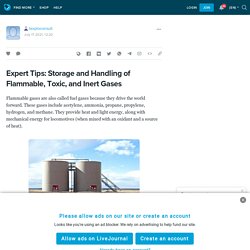
These gases include acetylene, ammonia, propane, propylene, hydrogen, and methane. They provide heat and light energy, along with mechanical energy for locomotives (when mixed with an oxidant and a source of heat). The case of toxic gases is different. These gases are produced during or after an industrial or mechanical process, especially in a closed and confined space.
Such gases include carbon monoxide, carbon dioxide, hydrogen sulfide, and gases released from certain hydrocarbons. Storage and Handling of Petroleum Products: Class A, B, and C. Texplo Consult — A Mini Guide To Petroleum & Explosives Safety... PESO: Online Registration for Petrol Pump by texploconsult. How to store Nitrogen and Hydrogen in a gas plant? As a colorless gas that doubles up as the lightest and commonest element in the universe, Hydrogen finds ample usage in both household and professional processes.
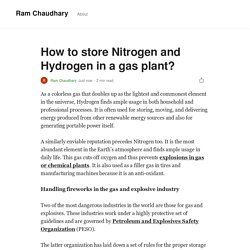
It is often used for storing, moving, and delivering energy produced from other renewable energy sources and also for generating portable power itself. A similarly enviable reputation precedes Nitrogen too. It is the most abundant element in the Earth’s atmosphere and finds ample usage in daily life. This gas cuts off oxygen and thus prevents explosions in gas or chemical plants. License Renewal for Explosive Substances Get Information on Form and Fees Here! Want a Petrol PumpLicense? Check with Petroleum and Explosives Safety Knowpia. Planning to open up a petrol pump but stuck with statutory compliance from regularity authorities?

What is PESO? Why should be concerned with it? Petroleum And Explosives Safety Organization (or PESO) was established during British India in the 1890sfor the Promotion of Industry and Internal Trade. What’s The Smartest Way to Handle Medical Oxygen and Fireworks?: texploconsult — LiveJournal. Summarily, going ahead with professional assistance could be the way.
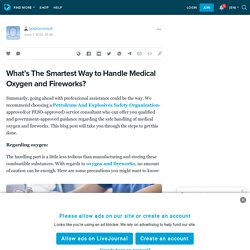
We recommend choosing a Petroleum And Explosives Safety Organization-approved(or PESO-approved) service consultant who can offer you qualified and government-approved guidance regarding the safe handling of medical oxygen and fireworks. This blog post will take you through the steps to get this done. Regarding oxygen: The handling part is a little less tedious than manufacturing and storing these combustible substances. With regards to oxygen and fireworks, no amount of caution can be enough. Petroleum and Explosives Safety Organization (PESO): License and Renewal PowerPoint Presentation - ID:10546432.
Petroleum and Explosives Safety Organization (PESO): License and Renewal Petroleum And Explosives Safety Organization (PESO) is a department formed by the Government of India.
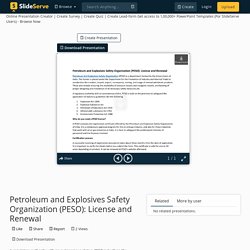
The former is placed under the Department for the Promotion of Industry and Internal Trade to standardize the creation, import, export, conveyance, storing, and usage of several petroleum products. These also include ensuring the availability of pressure vessels and cryogenic vessels, and backing of proper designing and installation of all necessary safety measures,etc. A regulatory authority with an autonomous status, PESO is built on the premises to safeguard the application of statutory guidelines like the following: 1.Explosives Act 1884 2.Explosive Substance Act 3.Petroleum (Production) Act 1934 4.Inflammable substance Act 1952 5.Environment Protection Act 1986 Why do you need a PESO license?
How To Store Oxygen For Processing Gas And Petroleum Products? With regards to our atmosphere, the dry air around us contains two main gases.
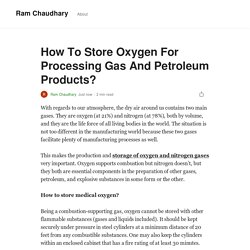
They are oxygen (at 21%) and nitrogen (at 78%), both by volume, and they are the life force of all living bodies in the world. The situation is not too different in the manufacturing world because these two gases facilitate plenty of manufacturing processes as well. This makes the production and storage of oxygen and nitrogen gases very important. Oxygen supports combustion but nitrogen doesn’t, but they both are essential components in the preparation of other gases, petroleum, and explosive substances in some form or the other. How to store medical oxygen? Oxygen Is So Important For Manufacturing Petroleum Products, Here’s How To Store And Handle It. Which Industry Expert Should I Trust For The Storage And Handling Of My Pressure Vessels? Knowpia.
Flammable gases, if left uncontained, can cause some serious havoc on the immediate surroundings.

They should thus always be kept under pressure in specially designed container sat a predesignated combination of temperature and pressure. The two variables are related through a combustion flashpoint that is defined as that minimum temperature that can cause the vapors of volatile material to ignite if kept near an ignition source. Please note that the flashpoint is different from the auto ignition temperature, which is the temperature that causes spontaneous ignition of the same volatile or flammable substance.This process requires a lot of expertise and focus, and should always be undertaken by experts.
Storage and handling of flammable gases. Introduction to Storage Tanks - Texplo. Storage Tanks Storage tanks containing organic liquids, non organic liquids, vapors and can be found in many industries.
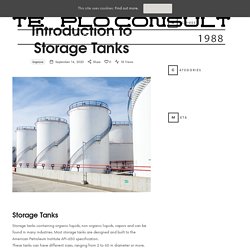
Most storage tanks are designed and built to the American Petroleum Institute API-650 specification. These tanks can have different sizes, ranging from 2 to 60 m diameter or more. What Can India Learn From The Beirut Explosion - Texplo. An explosion of 2,750 tonnes of ammonium nitrate in Lebanon capital Beirut — that killed 100 and injured more than 4,000 — has raised concerns over India’s use of the chemical compound and the policy mechanisms that regulate such use.
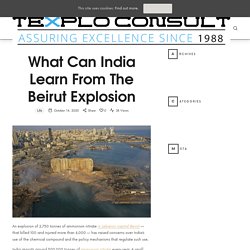
India imports around 300,000 tonnes of ammonium nitrate every year. A small portion of this is used to make explosives for mines, while the rest is used by fertiliser units. There were, however, reports of theft of the chemical in the past for illegal mining. The Ammonium Nitrate Rules, 2012 — that regulate the usage of the chemical — do not apply for quantities of less than five kilogrammes.
What Happens When Petroleum Runs Out? - Texplo. By the year 2080, the world’s supply of oil will be in steep decline.
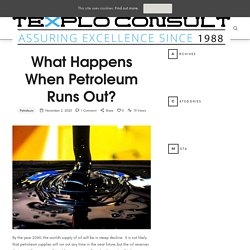
It is not likely that petroleum supplies will run out any time in the near future, but the oil reserves that are still economically viable to recover will not be there. It will take more energy to take the petroleum out of the ground than can be gained from the use of the produced oil. Petroleum and Explosives Safety Organization (PESO): License and Renewal. Petroleum And Explosives Safety Organization (PESO) is a department formed by the Government of India. The former is placed under the Department for the Promotion of Industry and Internal Trade to standardize the creation, import, export, conveyance, storing, and usage of several petroleum products. These also include ensuring the availability of pressure vessels and cryogenic vessels, and backing of proper designing and installation of all necessary safety measures,etc. Storage and Handling of Class A, B, and C Petroleum Products Could Be Risky!
Petroleum and explosives safety organization (peso) Classified into Class A,B, and C, petroleum products are all derived from a unique yellowish-black fossil fuel (called petroleum) that is extracted from ancient sea beds. It does take a lot of strategic processes of procurement, drilling, refinement, packaging, transportation, and safeguarding that invariably define the efficacy of this super-volatile viscous liquid. On top is the significance of handling them even after they are sent for selling. This calls in some of the best expertise on the subject matter who can classify the petroleum products as per their flash points and advise (and ensure) handling and usage for the end-user group. You could think of Abel Method or Pansky Marten Closed Cup Methods two obvious and standard solutions, and they are certainly two standard modes of operations in this regard. This is just where you would need to consult the experts, preferably with over three decades of experience in the domain.